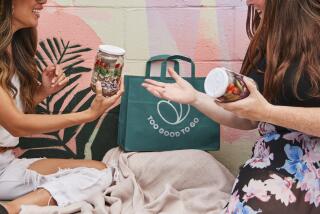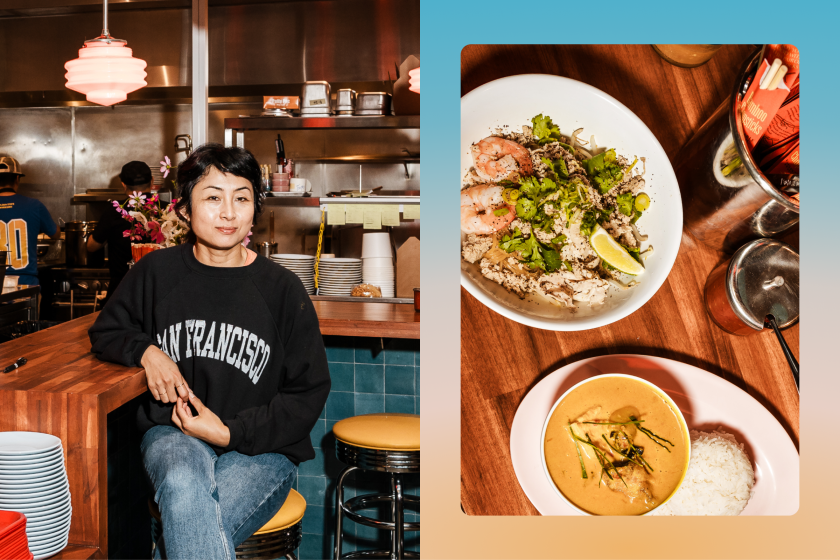Food for Thought : Hearts of the City / Exploring attitudes and issues behind the news : Leftovers From Resturants, Film Studios and Caterers Help Feed the Needy.
Well before the peak of the morning rush hour, Dan Pringle was already on the road, picking up dinner for the residents of Victory House, a Burbank drug and alcohol rehabilitation center.
Tooling down Olive Avenue in a rickety 1979 Dodge Custom, Pringle pulled gingerly into a security gate at the Warner Bros. studios, where he has a standing daily appointment at the service entrance to the cafeteria. Later, after picking up a quart of motor oil for insurance, he chugged 13 miles down the Ventura Freeway to a Koo Koo Roo chicken restaurant in Encino.
The T-shirt-clad Pringle was back at the Spartan center he manages by 10:30 a.m., carrying the dayâs haul: 15 sausage and pepperoni pizzas; four burritos; steaming table-sized pans of broccoli, bow-tie pasta and sausage and peppers; 100 pounds of turkey drumsticks, thighs and wings, and three trays of bagels, burgers and Danish--all wrapped and refrigerated, a day old but perfectly edible.
âWe wouldnât survive without this help,â emphasized Pringle, himself a former client of Victory House, which has been in operation since the late 1960s. âThe cost of food is incredibly high--especially feeding 48 men.â
Leftover croissants, quesadillas, designer pizzas?
Owners of Los Angeles restaurants, film studios and catering and food photography businesses once had little choice at dayâs end but to toss their uneaten gastronomic delights into the garbage.
But that has changed as a result of a 1989 state good Samaritan law eliminating the threat of liability lawsuits against food donors and the subsequent formation of the Extra Helpings program, administered by the Los Angeles Regional Foodbank.
Linking donor firms and dependent agencies--and supplying plastic insulated containers to safely transport the perishables--Extra Helpings assisted in routing more than 700,000 pounds of leftovers to hundreds of Los Angeles charities last year.
The program, participants say, is a classic win-win situation.
Social service agencies, many afloat in budgetary red ink, can help make ends meet with food that would otherwise rot.
âEveryone recognizes the waste of food out there,â said Ben Fiorino, director of the New Way Foundation in Burbank, which runs Victory House. The leftovers are âa godsend for us, a blessing.â
Food service firms, meanwhile, are able to help charities with little expenditure of time or effort. âIt makes me feel good working for a company that is supporting this,â said Gerard Greenhouse, kitchen manager at the Encino Koo Koo Roo outlet.
Donors can also receive tax write-offs and, for that matter, reduced waste hauling bills.
âWith climbing waste disposal costs, it makes economic sense and ecologic sense,â said Mike Taix of Les Freres Taix, a French restaurant near Echo Park.
Participants are a varied lot.
Damonâs Steak House in Glendale donates more than 100 pounds of ground beef a week to the Florence Crittenton Center, a Los Angeles residential treatment facility for abused teen-agers. Les Freres Taix turns over excess soup and potato salad to the nearby Good Shepherd Center for Homeless Women. At Dodger Stadium, the food concessionaire, Aramark, donates extra hot dogs, buns and popcorn to the Union Rescue Mission in Downtown Los Angeles.
Food photographers, including Jon Edwards of Monrovia, also participate. At least once a month, Edwards donates canned food and poultry from Smart & Final ad shoots to Foothill Unity, a food pantry for the homeless in Monrovia.
Domenicoâs Ristorante in Pasadena, meanwhile, prepares a special meal once a month for charitable organizations selected by the Regional Foodbank.
Hollywood, to some extent, also pitches in. Warner Bros. has a starring role, donating 25,000 pounds of second-day food each year from its cafeteria and film and TV productions, according to food services director Ron Craig. At Disney Studios, surplus food from cast meals at tapings of âHome Improvementâ and âEllenâ is also provided to Victory House.
Despite the obvious benefits and limited red tape, experts say there is still much room for the program to grow.
âThereâs not nearly enough restaurants participating. . . . Thereâs great opportunities out there that just havenât been tapped,â said Alberta Hultman, assistant executive vice president of the California Restaurant Assn. âMany restaurant people work 16 hours a day, so you have to say something five or six times to get their attention. You have to tell them and tell them and tell them.â
Hultman suggests that county health inspectors, when making the rounds of restaurants and other food preparation centers, could distribute information on how to donate excess food.
Hultman, whose organization itself gives away thousands of pounds of food after its annual industry trade show, also suggests that restaurant patrons put the word out. âIf they frequent a neighborhood restaurant and know the owner or manager, they should say something and encourage it, because part of what the restaurant gets back is good community relations.â
Not that there arenât some logistics problems.
Many charities find it impossible to participate because they do not have the vehicles needed to pick up the food. âNot every agency can hop in a van and get the food,â said Doris Bloch, executive director of the Regional Foodbank. âWe havenât attempted it countywide ourselves because the geography of Los Angeles is so daunting.â
On the Westside, a network of community volunteers has been established to pick up and deliver food to about 30 charities, according to Bruce Rosen, who runs the Extra Helpings Westside program.
Health is also a prime consideration. Food bank officials say charitable agencies receive safety training to help ensure that donated food is stored and prepared properly before being served to the needy.
âThese people are indigents and possibly medically compromised,â said Art Tilzer, director of consumer protection and environmental health for the county Department of Health Services. âThat amplifies significantly the importance of good procedures.â
The Beat
Todayâs centerpiece focuses on a community program designed to make use of food that would otherwise go to waste. With hunger a looming problem, here are some agencies that can use donations or volunteer help:
Southern California Interfaith Hunger Coalition: (213) 913-7333
The Los Angeles Regional Foodbank: (213) 234-3030; âExtra Helpingsâ program ext. 131.
The Foodbank of Southern California: (310) 435-3577
Love is Feeding Everyone: (213) 936-0895
More to Read
Eat your way across L.A.
Get our weekly Tasting Notes newsletter for reviews, news and more.
You may occasionally receive promotional content from the Los Angeles Times.










